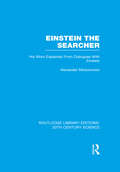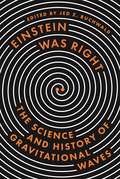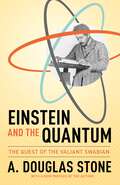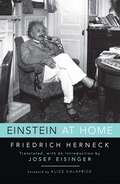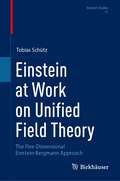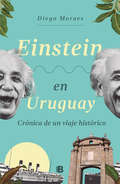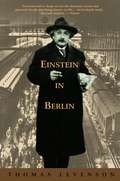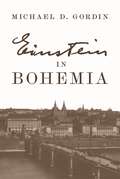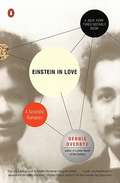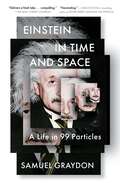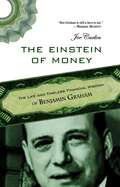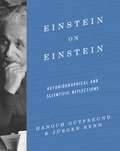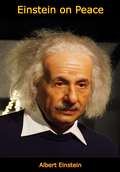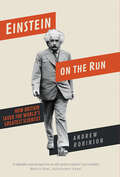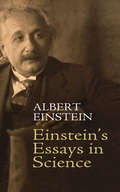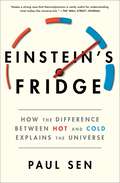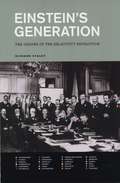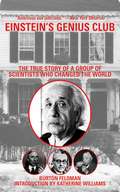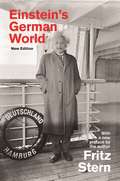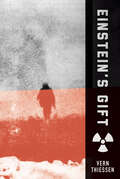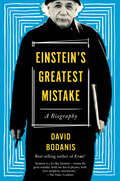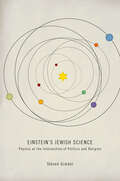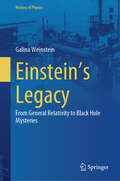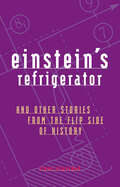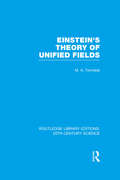- Table View
- List View
Einstein The Searcher: His Work Explained from Dialogues with Einstein (Routledge Library Editions: 20th Century Science)
by Alexander MoszkowskiThis volume, first published in 1921, presents a series of portraits of Einstein, thus offering glimpses in the character and private reflections of the man who changed the course of modern science. Intended neither as a biography, nor as a résumé of Einsteinian physics, Einstein: The Searcher instead focusses on Einstein’s relationship with the scientific project as he himself conceived it, and so is still of contemporary significance for those puzzled by the spirit of scientific enquiry.
Einstein Was Right: The Science and History of Gravitational Waves
by Kip S. Thorne Harry Collins Jürgen Renn Daniel Kennefick Tilman Sauer Don Howard Alessandra Buonanno Professor Diana K. Buchwald Barry C. BarishAn authoritative interdisciplinary account of the historic discovery of gravitational wavesIn 1915, Albert Einstein predicted the existence of gravitational waves—ripples in the fabric of spacetime caused by the movement of large masses—as part of the theory of general relativity. A century later, researchers with the Laser Interferometer Gravitational-Wave Observatory (LIGO) confirmed Einstein's prediction, detecting gravitational waves generated by the collision of two black holes. Shedding new light on the hundred-year history of this momentous achievement, Einstein Was Right brings together essays by two of the physicists who won the Nobel Prize for their instrumental roles in the discovery, along with contributions by leading scholars who offer unparalleled insights into one of the most significant scientific breakthroughs of our time.This illuminating book features an introduction by Tilman Sauer and invaluable firsthand perspectives on the history and significance of the LIGO consortium by physicists Barry Barish and Kip Thorne. Theoretical physicist Alessandra Buonanno discusses the new possibilities opened by gravitational wave astronomy, and sociologist of science Harry Collins and historians of science Diana Kormos Buchwald, Daniel Kennefick, and Jürgen Renn provide further insights into the history of relativity and LIGO. The book closes with a reflection by philosopher Don Howard on the significance of Einstein's theory for the philosophy of science.Edited by Jed Buchwald, Einstein Was Right is a compelling and thought-provoking account of one of the most thrilling scientific discoveries of the modern age.
Einstein and the Quantum: The Quest of the Valiant Swabian
by A. Douglas StoneThe untold story of Albert Einstein's role as the father of quantum theoryEinstein and the Quantum reveals for the first time the full significance of Albert Einstein's contributions to quantum theory. Einstein famously rejected quantum mechanics, observing that God does not play dice. But, in fact, he thought more about the nature of atoms, molecules, and the emission and absorption of light—the core of what we now know as quantum theory—than he did about relativity.A compelling blend of physics, biography, and the history of science, Einstein and the Quantum shares the untold story of how Einstein—not Max Planck or Niels Bohr—was the driving force behind early quantum theory. It paints a vivid portrait of the iconic physicist as he grappled with the apparently contradictory nature of the atomic world, in which its invisible constituents defy the categories of classical physics, behaving simultaneously as both particle and wave. And it demonstrates how Einstein's later work on the emission and absorption of light, and on atomic gases, led directly to Erwin Schrödinger's breakthrough to the modern form of quantum mechanics. The book sheds light on why Einstein ultimately renounced his own brilliant work on quantum theory, due to his deep belief in science as something objective and eternal.
Einstein at Home
by Friedrich HerneckThese intimate, candid descriptions of the private life of Albert Einstein come from a series of interviews with Herta Waldow, a housekeeper who lived with Einstein and his wife and daughter from 1927 to 1933 at their residence in Berlin. After World War II, science historian Friedrich Herneck interviewed Ms. Waldow and published the conversations in the former East Germany. Unavailable in English till now, these five interviews offer fascinating glimpses into the great scientist's daily routines while he lived as a celebrated scientist in Weimar Germany. Einstein's well-known idiosyncrasies come to life in these conversations: his disheveled hair that was only poorly trimmed by his myopic wife, his love of classical music, his playing of the violin to help him think, his delight in sailing, his wide circle of friends and many social engagements, and his female companions besides his wife. Many celebrity acquaintances are also mentioned: from movie star Charlie Chaplin and conductor Erich Kleiber to writers Thomas and Heinrich Mann and fellow scientists Max Planck, Max Born, and Erwin Schrödinger. With a detailed introduction that puts these interviews in context, these colorful conversations create a vivid picture of Albert Einstein the man.
Einstein at Work on Unified Field Theory: The Five-Dimensional Einstein-Bergmann Approach (Einstein Studies #17)
by Tobias SchützThis book meticulously examines over one hundred documents of research notes by Albert Einstein, many of which were previously unidentified, held in the archives of The Hebrew University of Jerusalem and the Einstein Papers Project at Caltech. Focused on Einstein's quest for a five-dimensional unified field theory of gravitation and electromagnetism, the analysis provides unique insights into his mathematical skills, thinking, and modus operandi. This academic exploration also investigates the role of mathematics in Einstein’s theorizing with a special focus on projective geometry and delta functions.
Einstein en Uruguay: Crónica de un viaje histórico
by Diego MoraesUn exhaustivo trabajo de investigación en el que Diego Moraes reconstruye el viaje de uno de los personajes más importantes en la historia de la humanidad y un Uruguay a la vanguardia de la cultura y el pensamiento. En 1925 el famoso físico alemán Albert Einstein realizó una histórica visita al Uruguay. Casi cien años han pasado desde entonces pero, en la actualidad, ¿qué sabemos los uruguayos sobre aquel episodio? Una estatua ubicada en la Plaza de los Treinta y Tres, en el Centro montevideano, recuerda el momento más famoso de aquella visita: el célebre encuentro mantenido en ese mismo sitio entre Einstein y el filósofo Carlos Vaz Ferreira. Sin embargo, es poco más lo que se conoce, en términos generales. ¿Qué vino a hacer Einstein al Uruguay? ¿Quién lo invitó a nuestro país y por qué? ¿Qué personajes prominentes de la sociedad uruguaya conoció durante su estadía? ¿Dónde se alojó? ¿Qué actividades realizó durante la semana que permaneció en suelo uruguayo? ¿Qué impresión dejó entre los compatriotas de 1925? E, inversa mente, ¿qué opinión guardó luego de su paso por estas tierras? Estas son solo algunas de las preguntas que este libro aspira a responder.
Einstein in Berlin
by Thomas LevensonIn a book that is both biography and the most exciting form of history, here are eighteen years in the life of a man, Albert Einstein, and a city, Berlin, that were in many ways the defining years of the twentieth century. Einstein in BerlinIn the spring of 1913 two of the giants of modern science traveled to Zurich. Their mission: to offer the most prestigious position in the very center of European scientific life to a man who had just six years before been a mere patent clerk. Albert Einstein accepted, arriving in Berlin in March 1914 to take up his new post. In December 1932 he left Berlin forever. “Take a good look,” he said to his wife as they walked away from their house. “You will never see it again.”In between, Einstein’s Berlin years capture in microcosm the odyssey of the twentieth century. It is a century that opens with extravagant hopes--and climaxes in unparalleled calamity. These are tumultuous times, seen through the life of one man who is at once witness to and architect of his day--and ours. He is present at the events that will shape the journey from the commencement of the Great War to the rumblings of the next one. We begin with the eminent scientist, already widely recognized for his special theory of relativity. His personal life is in turmoil, with his marriage collapsing, an affair under way. Within two years of his arrival in Berlin he makes one of the landmark discoveries of all time: a new theory of gravity--and before long is transformed into the first international pop star of science. He flourishes during a war he hates, and serves as an instrument of reconciliation in the early months of the peace; he becomes first a symbol of the hope of reason, then a focus for the rage and madness of the right. And throughout these years Berlin is an equal character, with its astonishing eruption of revolutionary pathways in art and architecture, in music, theater, and literature. Its wild street life and sexual excesses are notorious. But with the debacle of the depression and Hitler’s growing power, Berlin will be transformed, until by the end of 1932 it is no longer a safe home for Einstein. Once a hero, now vilified not only as the perpetrator of “Jewish physics” but as the preeminent symbol of all that the Nazis loathe, he knows it is time to leave.
Einstein in Bohemia
by Professor Michael D. GordinA finely drawn portrait of Einstein's sixteen months in PragueIn the spring of 1911, Albert Einstein moved with his wife and two sons to Prague, the capital of Bohemia, where he accepted a post as a professor of theoretical physics. Though he intended to make Prague his home, he lived there for just sixteen months, an interlude that his biographies typically dismiss as a brief and inconsequential episode. Einstein in Bohemia is a spellbinding portrait of the city that touched Einstein's life in unexpected ways—and of the gifted young scientist who left his mark on the science, literature, and politics of Prague.Michael Gordin's narrative is a masterfully crafted account of a person encountering a particular place at a specific moment in time. Despite being heir to almost a millennium of history, Einstein's Prague was a relatively marginal city within the sprawling Austro-Hungarian Empire. Yet Prague, its history, and its multifaceted culture changed the trajectories of Einstein's personal and scientific life. It was here that his marriage unraveled, where he first began thinking seriously about his Jewish identity, and where he embarked on the project of general relativity. Prague was also where he formed lasting friendships with novelist Max Brod, Zionist intellectual Hugo Bergmann, physicist Philipp Frank, and other important figures.Einstein in Bohemia sheds light on this transformative period of Einstein's life and career, and brings vividly to life a beguiling city in the last years of the Austro-Hungarian Empire.
Einstein in Love
by Dennis OverbyeIn Einstein in Love, Dennis Overbye has written the first profile of the great scientist to focus exclusively on his early adulthood, when his major discoveries were made. It reveals Einstein to be very much a young man of his time-draft dodger, self-styled bohemian, poet, violinist, and cocky, charismatic genius who left personal and professional chaos in his wake. Drawing upon hundreds of unpublished letters and a decade of research, Einstein in Love is a penetrating portrait of the modern era's most influential thinker.
Einstein in Time and Space: A Life in 99 Particles
by Samuel GraydonWalter Isaacson&’s Einstein meets Craig Brown&’s 99 Glimpses of Princess Margaret, in this innovative biography of the famous physicist told in ninety-nine dazzling vignettes.Most of us would agree that Albert Einstein&’s name is synonymous with &“genius&” and that his likeness is often used as a shorthand for all scientists, appearing everywhere from cartoons to textbooks. He has become more myth than man. That being the case, how best to capture his essence? In Einstein in Time and Space, talented young science journalist Samuel Graydon answers that question with an illuminating mosaic—99 intriguingly different particles that cumulatively reveal Einstein&’s contradictory and multitudinous nature. Glimpsed among these shards: a slacker who failed every subject but math, a job seeker who couldn&’t get hired, a lothario who courted many women, and a charmer who was the life of the party. As brilliant as he was inconsistent, Einstein was simultaneously an avid supporter of the NAACP and the fight for civil rights and someone capable of great prejudice. He was loved by many, known by few, and inspirational to a generation of young physicists. Graydon reveals every corner of Einstein&’s world: the false reporting that rocketed Einstein to fame nearly overnight, his effect on people he met merely in passing, even the remarkable posthumous journey of the famed physicist&’s brain. Entertaining, comforting, bolstering, and shocking, Einstein in Time and Space is the unique story of a man who redefined how we view our universe and our place within it.
Einstein of Money: The Life and Timeless Financial Wisdom of Benjamin Graham
by Joe CarlenWarren Buffett-widely considered the most successful investor of all time-has repeatedly acknowledged Benjamin Graham as the primary influence on his investment approach. Indeed, there is a direct line between the record-shattering investing performance of Buffett (and other value investors) and Graham's life. In six books and dozens of papers, Graham-known as the "Dean of Wall Street"-left an extensive account of an investing system that, as Buffett can attest, actually works! This biography of Benjamin Graham, the first written with access to his posthumously published memoirs, explains Graham's most essential wealth-creation concepts while telling the colorful story of his amazing business career and his multifaceted, unconventional personal life. The author distills the best from Graham's extensive published works and draws from personal interviews he conducted with Warren Buffett, Charles Brandes, and many other top US and global value investors, as well as Graham's surviving children and friends. Warren Buffett once said, "No one ever became poor by reading Graham." Find out for yourself by reading Carlen's lively account of Benjamin Graham's fascinating life and time-tested techniques for generating wealth.
Einstein on Einstein: Autobiographical and Scientific Reflections
by Hanoch Gutfreund Jürgen RennNew perspectives on the iconic physicist's scientific and philosophical formationAt the end of World War II, Albert Einstein was invited to write his intellectual autobiography for the Library of Living Philosophers. The resulting book was his uniquely personal Autobiographical Notes, a classic work in the history of science that explains the development of his ideas with unmatched warmth and clarity. Hanoch Gutfreund and Jürgen Renn introduce Einstein's scientific reflections to today's readers, tracing his intellectual formation from childhood to old age and offering a compelling portrait of the making of a philosopher-scientist.Einstein on Einstein features the full English text of Autobiographical Notes along with incisive essays that place Einstein's reflections in the context of the different stages of his scientific life. Gutfreund and Renn draw on Einstein's writings, personal correspondence, and critical writings by Einstein's contemporaries to provide new perspectives on his greatest discoveries. Also included are Einstein's responses to his critics, which shed additional light on his scientific and philosophical worldview. Gutfreund and Renn quote extensively from Einstein's initial, unpublished attempts to formulate his response, and also look at another brief autobiographical text by Einstein, written a few weeks before his death, which is published here for the first time in English.Complete with evocative drawings by artist Laurent Taudin, Einstein on Einstein illuminates the iconic physicist's journey to general relativity while situating his revolutionary ideas alongside other astonishing scientific breakthroughs of the twentieth century.
Einstein on Peace: His Private Thoughts And Public Stands On Nationalism, Zionism, War, Peace, And The Bomb
by Albert Einstein Otto Nathan“Einstein was not only the ablest man of science of his generation, he was also a wise man, which is something different. If statesmen had listened to him, the course of human events would have been less disastrous than it has been.”This verdict, from the Preface by Bertrand Russell, sums up the importance of this first collection of Albert Einstein’s writings on war, peace, and the atom bomb. In this volume, thanks to the Estate of Albert Einstein, the complete story is told of how one of the greatest minds of modern times worked from 1914 until 1955 on the problem of peace. It is a fascinating record of a man’s courage, his sincerity, and his concern for those who survive him.This book is also a history of the peace movement in modern times. Here are letters to and from some of the most famous men of his generation, including the correspondence between Einstein and Sigmund Freud on aggression and war, and the true story of his famous letter to President Roosevelt reporting the theoretical possibility of nuclear fission. It is the living record of more than forty years of Einstein’s untiring struggle to mobilize forces all over the world for the abolition of war and the creation of a supranational organization to solve conflicts among nations.
Einstein on the Run: How Britain Saved the World's Greatest Scientist
by Andrew RobinsonA "highly readable" account of the role Britain played in Einstein's life—by inspiring his teenage passion for physics and providing refuge from the Nazis (The Wall Street Journal).In late 1933, Albert Einstein found himself living alone in an isolated holiday hut in rural England. There, he toiled peacefully at mathematics, occasionally stepping out for walks or to play his violin. But how had Einstein come to abandon his Berlin home and go “on the run”?This lively account tells the story of the world’s greatest scientist’s time in Britain for the first time, showing why the country was the perfect refuge for Einstein from rumored assassination plots by Nazi agents. Young Einstein’s passion for British physics, epitomized by Newton, had sparked his scientific development around 1900. British astronomers had confirmed his general theory of relativity, making him internationally famous in 1919. Welcomed by the British people, who helped him campaign against Nazi anti-Semitism, he even intended to become a British citizen. So why did Einstein then leave Britain, never to return to Europe?“A vivid look at how the U.K. affected the German-born physicist’s life and thinking.” —Publishers Weekly“A marvelous job of pulling new and interesting material out of the Einstein archives . . . I suspect that even readers who have devoured many books about Einstein and are already familiar with his interactions with the English . . . will find much to learn and enjoy.” —Metascience Journal“Robinson has that rare knack for presenting a near-encyclopedic volume of historical information, anecdotes and contemporaneous accounts in a thoroughly delightful fashion.” —Physics WorldIncludes photographs and illustrations
Einstein's Essays in Science
by Albert Einstein Alan HarrisHis name is synonymous with "genius," but these essays by the renowned physicist and scholar are accessible to any reader. In addition to outlining the core of relativity theory in everyday language, Albert Einstein presents fascinating discussions of other scientific fields to which he made significant contributions. The Nobel Laureate also profiles some of history's most influential physicists, upon whose studies his own work was based.Assembled during Einstein's lifetime from his speeches and essays, this book marks the first presentation to the wider world of the scientist's accomplishments in the field of abstract physics. Along with relativity theory, these articles examine the methods of theoretical physics, principles of research, and the concept of scientific truth. Einstein's speeches to audiences at Columbia University and the Prussian Academy of Science appear here, along with his insightful observations on such giants of science as Johannes Kepler, Sir Isaac Newton, James Clerk Maxwell, Niels Bohr, Max Planck, and others.
Einstein's Fridge: How the Difference Between Hot and Cold Explains the Universe
by Paul SenAn entertaining, eye-opening account of the extraordinary team of innovators who discovered the laws of thermodynamics essential to understanding the world today—from refrigeration and jet engines to calorie counting and global warming—for fans of How We Got to Now and A Short History of Nearly Everything.Einstein&’s Fridge tells the incredible epic story of the scientists who, over two centuries, harnessed the power of heat and ice and formulated a theory essential to comprehending our universe. Thermodynamics—the branch of physics that deals with energy and entropy—is the least known and yet most consequential of all the sciences. It governs everything from the behavior of living cells to the black hole at the center of our galaxy. Not only that, but thermodynamics explains why we must eat and breathe, how lights turn on, the limits of computing, and how the universe will end. The brilliant people who decoded its laws came from every branch of the sciences; they were engineers, physicists, chemists, biologists, cosmologists, and mathematicians. From French military engineer and physicist Sadi Carnot to Lord Kelvin, James Joule, Albert Einstein, Emmy Noether, Alan Turing, and Stephen Hawking, author Paul Sen introduces us to all of the players who passed the baton of scientific progress through time and across nations. Incredibly driven and idealistic, these brave pioneers performed groundbreaking work often in the face of torment and tragedy. Their discoveries helped create the modern world and transformed every branch of science, from biology to cosmology. Einstein&’s Fridge brings to life one of the most important scientific revolutions of all time and captures the thrill of discovery and the power of scientific progress to shape the course of history.
Einstein's Generation: The Origins of the Relativity Revolution
by Richard StaleyWhy do we celebrate Einstein's era above all other epochs in the history of physics? Much of the history of physics at the beginning of the twentieth century has been written with a sharp focus on a few key figures and a handful of notable events. Einstein's Generation offers a distinctive new approach to the origins of modern physics by exploring both the material culture that stimulated relativity and the reaction of Einstein's colleagues to his pioneering work. Richard Staley weaves together the diverse strands of experimental and theoretical physics, commercial instrument making, and the sociology of physics around 1900 to present the collective efforts of a group whose work helped set the stage for Einstein's revolutionary theories and the transition from classical to modern physics that followed. Collecting papers, talks, catalogues, conferences, and correspondence, Staley juxtaposes scientists' views of relativity at the time to modern accounts of its history. Einstein's Generation tells the story of a group of individuals which produced some of the most significant advances of the twentieth century; and challenges our celebration of Einstein's era above all others.
Einstein's Genius Club: The True Story of a Group of Scientists Who Changed the World
by Burton Feldman Katherine WilliamsAs World War II wound down and it became increasingly clear that the Allies would emerge victorious, Albert Einstein invited three close friends-all titans of contemporary science and philosophy-to his home at 112 Mercer Street in Princeton, New Jersey, to discuss what they loved best-science and philosophy. His guests were the legendary philosopher and pacifist, Bertrand Russell; the boy wonder of quantum physics, Wolfgang Pauli; and the brilliant logician, Kurt Gödel. Their casual meetings took place far from the horrific battlefields of the war and the (then) secret lair of experimental atomic physicists in Los Alamos, New Mexico.Using these historic meetings as his launching pad, Feldman sketches the lives and contributions of the four friends, colleagues, and rivals-especially Einstein, innately self-confident but frustrated in his attempt to come up with a unified theory, and the aristocratic but self-doubting Lord Russell. Masterfully researched, this book accessibly illuminates the feelings of these notable men about the world of science that was then beginning to pass them by, and about the dawning atomic age that terrified them all.
Einstein's German World: New Edition
by Fritz SternThe French political philosopher Raymond Aron once observed that the twentieth century "could have been Germany's century." In 1900, the country was Europe's preeminent power, its material strength and strident militaristic ethos apparently balanced by a vital culture and extraordinary scientific achievement. It was poised to achieve greatness. In Einstein's German World, the eminent historian Fritz Stern explores the ambiguous promise of Germany before Hitler, as well as its horrifying decline into moral nihilism under Nazi rule, and aspects of its remarkable recovery since World War II. He does so by gracefully blending history and biography in a sequence of finely drawn studies of Germany's great scientists and of German-Jewish relations before and during Hitler's regime. Stern's central chapter traces the complex friendship of Albert Einstein and the Nobel Prize-winning chemist Fritz Haber, contrasting their responses to German life and to their Jewish heritage. Haber, a convert to Christianity and a firm German patriot until the rise of the Nazis; Einstein, a committed internationalist and pacifist, and a proud though secular Jew. Other chapters, also based on new archival sources, consider the turbulent and interrelated careers of the physicist Max Planck, an austere and powerful figure who helped to make Berlin a happy, productive place for Einstein and other legendary scientists; of Paul Ehrlich, the founder of chemotherapy; of Walther Rathenau, the German-Jewish industrialist and statesman tragically assassinated in 1922; and of Chaim Weizmann, chemist, Zionist, and first president of Israel, whose close relations with his German colleagues is here for the first time recounted. Stern examines the still controversial way that historians have dealt with World War I and Germans have dealt with their nation's defeat, and he analyzes the conflicts over the interpretations of Germany's past that persist to this day. He also writes movingly about the psychic cost of Germany's reunification in 1990, the reconciliation between Germany and Poland, and the challenges and prospects facing Germany today. At once historical and personal, provocative and accessible, Einstein's German World illuminates the issues that made Germany's and Europe's past and present so important in a tumultuous century of creativity and violence.
Einstein's Gift
by Vern ThiessenEinstein’s Gift follows the life and work of Nobel laureate Dr. Fritz Haber, a man who risked everything for a country that never accepted him. Haber, a chemist who worked hard to enhance life, discovered too late that when his knowledge was put in the hands of the wrong people, millions would die and that his efforts to serve humanity were futile against political will, nationalism, and war. This updated edition of Vern Thiessen’s compelling play about the collision of power and pride still resonates with verve and vigour.
Einstein's Greatest Mistake: A Biography
by David Bodanis&“What Bodanis does brilliantly is to give us a feel for Einstein as a person. I don&’t think I&’ve ever read a book that does this as well . . . Whenever there&’s a chance for storytelling, Bodanis triumphs.&” —Popular Science &“Fascinating.&” —Forbes Widely considered the greatest genius of all time, Albert Einstein revolutionized our understanding of the cosmos with his general theory of relativity and helped lead us into the atomic age. Yet in the final decades of his life, he was ignored by most working scientists, and his ideas were opposed by even his closest friends. How did this happen? Best-selling biographer David Bodanis traces the arc of Einstein&’s life—from the skeptical, erratic student to the world&’s most brilliant physicist to the fallen-from-grace celebrity. An intimate biography in which &“theories of the universe morph into theories of life&” (Times, London), Einstein&’s Greatest Mistake reveals what we owe Einstein today—and how much more he might have achieved if not for his all-too-human flaws.
Einstein's Jewish Science: Physics at the Intersection of Politics and Religion
by Steven GimbelFinalist for the Gerrard and Ella Berman Memorial Award of the Jewish Book CouncilIs relativity Jewish? The Nazis denigrated Albert Einstein’s revolutionary theory by calling it "Jewish science," a charge typical of the ideological excesses of Hitler and his followers. Philosopher of science Steven Gimbel explores the many meanings of this provocative phrase and considers whether there is any sense in which Einstein’s theory of relativity is Jewish. Arguing that we must take seriously the possibility that the Nazis were in some measure correct, Gimbel examines Einstein and his work to explore how beliefs, background, and environment may—or may not—have influenced the work of the scientist. You cannot understand Einstein’s science, Gimbel declares, without knowing the history, religion, and philosophy that influenced it. No one, especially Einstein himself, denies Einstein's Jewish heritage, but many are uncomfortable saying that he was being a Jew while he was at his desk working. To understand what "Jewish" means for Einstein’s work, Gimbel first explores the many definitions of "Jewish" and asks whether there are elements of Talmudic thinking apparent in Einstein’s theory of relativity. He applies this line of inquiry to other scientists, including Isaac Newton, René Descartes, Sigmund Freud, and Émile Durkheim, to consider whether their specific religious beliefs or backgrounds manifested in their scientific endeavors. Einstein's Jewish Science intertwines science, history, philosophy, theology, and politics in fresh and fascinating ways to solve the multifaceted riddle of what religion means—and what it means to science. There are some senses, Gimbel claims, in which Jews can find a special connection to E = mc2, and this claim leads to the engaging, spirited debate at the heart of this book.
Einstein's Legacy: From General Relativity to Black Hole Mysteries (History of Physics)
by Galina WeinsteinThis book offers a comprehensive exploration into the intertwined realms of Einstein's theory of general relativity, the discoveries of black holes, and the quantum conundrums that challenge our understanding of the universe. It delves into the fascinating journey from the birth of general relativity to the cutting-edge debates surrounding black holes, wormholes, and quantum physics. The narrative weaves through the historical milestones, including Schwarzschild's 1916 solution, the emergence of black holes in theoretical physics, and the ongoing quest to reconcile general relativity with quantum mechanics. Central to the book is exploring the information paradox and its implications for modern physics, shedding light on the profound questions and theoretical challenges that have captivated physicists for decades. It also critically examines the ER=EPR conjecture, a pivotal idea proposed by Leonard Susskind and Juan Maldacena, which suggests a deep connection between entangled quantumparticles and the structure of spacetime. In addition, the book engages with contemporary theoretical experiments on wormholes, framed within Nancy Cartwright's philosophical theories, offering a unique perspective on the reliability and interpretation of these groundbreaking scientific concepts. The main topics covered are not only crucial for understanding the universe but also embody the ongoing quest for a unified theory in physics. They represent the cutting edge of scientific inquiry, where the mysteries of black holes, the fabric of spacetime, and the perplexities of quantum mechanics converge. This book is designed for physicists, historians of science, and academically inclined readers interested in the evolution of theoretical physics and the groundbreaking ideas that have shaped our understanding of the cosmos. It offers a detailed yet accessible narrative, making it an invaluable resource for anyone seeking to grasp the complexities and triumphs of modern physics.
Einstein's Refrigerator: And Other Stories from the Flip Side of History
by Steve SilvermanUseless—and fascinating—information from the man with &“the reputation as the science teacher with 1,000 different stories to excite young minds&” (ABC News). Steve Silverman was looking for a way to add some spice to his high school lectures when he realized that weird and bizarre true-life stories would capture his students&’ attention. In fact, they worked so well that the science teacher then began posting his discoveries to his own Web site, which he dubbed Useless Information. Well-researched and clearly sourced, Silverman&’s unusual tidbits have gained a wide following. In Einstein&’s Refrigerator, Silverman collects more than thirty of the most fascinating stories he has gathered—tales of forgotten genius, great blunders, and incredible feats of survival, as well as answers to puzzling questions. Einstein&’s Refrigerator is a remarkable book with spellbinding stories. Whatever happened to the refrigerator Einstein helped invent? While it never became a commercial success, its underlying concepts became the basis for cooling nuclear breeder reactors.
Einstein's Theory of Unified Fields (Routledge Library Editions: 20th Century Science)
by Marie Antoinette TonnelatFirst published in1966, here is presented a comprehensive overview of one of the most elusive scientific speculations by the pre-eminent genius of the 20th century. The theory is viewed by some scientists with deep suspicion, by others with optimism, but all agree that it represents an extreme challenge. As the author herself affirms, this work is not intended to be a complete treatise or ‘didactic exposition’ of the theory of unified fields, but rather a tool for further study, both by students and professional physicists. Dealing with all the major areas of research which together comprise the development of a working model, the author ranges over conservation equations, variational principles, solutions of spherical symmetry, and treats a wide selection of Einstein’s own equations. The final chapter indicates problems associated with the unified field theory, in particular the energy-momentum tensor and geodesics.
